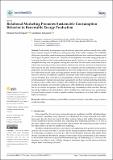Por favor, use este identificador para citar o enlazar a este item:
http://hdl.handle.net/10261/347785COMPARTIR / EXPORTAR:
 SHARE
BASE SHARE
BASE
|
|
| Visualizar otros formatos: MARC | Dublin Core | RDF | ORE | MODS | METS | DIDL | DATACITE | |

| Título: | Relational Marketing Promotes Sustainable Consumption Behavior in Renewable Energy Production |
Autor: | Sadjadi, Ebrahim Navid; Fernández, Roemi | Palabras clave: | relational marketing sustainability consumer behavior renewable energy business model innovation |
Fecha de publicación: | mar-2023 | Editor: | Multidisciplinary Digital Publishing Institute | Citación: | Sustainability Science 15, 5714 | Resumen: | Until recently, the prominent stage of electricity generation has been carried out by utility firms; however, the general landscape of power generation in the world is changing. The availability of low-cost photovoltaic panels is encouraging households to become local producers themselves and sell energy to the grid at a micro-scale. Therefore, the development of renewable energy production is increasing the domain of the energy market from pure product delivery to a market of mixed services and goods delivery, with new players entering the value chain. For this reason, utility firms need to rethink their marketing activities, their interface and interaction with the consumer, the infrastructure they need for the flow of their production to the consumer, and the architecture of their value proposition. Faced with the growing market for renewable energy services, this study investigates how utility firms should target marketing activities to take advantage of business opportunities in the newer networks of competitive coalitions. The results of the study carried out suggest that firms need to strengthen their competitiveness and capability in internal marketing, their core competence in technological development and personnel management, and their external marketing promotions. By doing so, firms will be able to compete with established technologies and generate revenue by treating the disruptive and innovative technologies of the distributed generation as the gateway to the service market, and prospect the S-D-dominant logic of marketing in their activities. Moving beyond the traditional electricity delivery culture of utility firms could open up new opportunities for growth and expansion to attract a greater number of consumers, as is done today in similar high-tech industries. | URI: | http://hdl.handle.net/10261/347785 | ISSN: | 2071-1050 |
| Aparece en las colecciones: | (CAR) Artículos |
Ficheros en este ítem:
| Fichero | Descripción | Tamaño | Formato | |
|---|---|---|---|---|
| sustainability-15-05714-v2.pdf | Artículo principal | 983,78 kB | Adobe PDF |  Visualizar/Abrir |
CORE Recommender
Este item está licenciado bajo una Licencia Creative Commons

